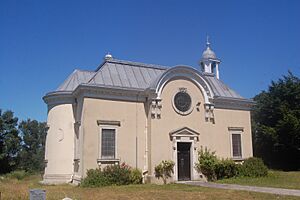All Saints' Church, Thorney Hill facts for kids
Quick facts for kids All Saints' Church |
|
|---|---|

All Saints' Church
|
|
| Religion | |
| Affiliation | Church of England |
| Ecclesiastical or organizational status | Active |
| Year consecrated | 1906 |
| Location | |
| Location | Thorney Hill, Hampshire, England |
| Architecture | |
| Architect(s) | Detmar Blow |
| Architectural type | Church |
| Architectural style | Baroque |
|
Listed Building – Grade I
|
|
| Official name | Church of All Saints |
| Designated | 24 September 1985 |
| Reference no. | 1302198 |
All Saints' Church is a special church in Thorney Hill, England, that belongs to the Church of England. It was built between 1905 and 1906. Since 1985, it has been a 'Grade I listed building,' which means it's a very important historical building. There's also a memorial outside the church for World War I, which is also a protected historical site.
Contents
The Church's Story
Why All Saints' Church Was Built
All Saints' Church was built by Lord and Lady Manners. They wanted it to be a special memorial for their daughter, Mary Christine. She sadly passed away in 1904 from a sickness called cholera while she was visiting India. The church was built near their home, Avon Tyrrell House, and served the people living on their estate.
Building the Church
A famous architect named Detmar Blow designed the church. Lady Manners placed the first stone, called the foundation stone, on October 9, 1905. A company called Messrs Newton built the church.
Opening and Celebrations
The church was officially opened on October 17, 1906, by the Bishop of Winchester, Herbert Edward Ryle. After that, the church began serving the people of Thorney Hill, Bransgore, and other nearby areas. On October 8, 2006, the church celebrated its 100th birthday with a special service. The Bishop of Winchester, Michael Scott-Joynt, led this celebration.
What the Church Looks Like
Design and Materials
All Saints' Church is described by Historic England as a "remarkable Edwardian Baroque church." This means it has a grand and decorative style from the early 1900s. It is built using Caen stone and brick that has been covered with a smooth finish. The roof is made of aluminum and has a small dome, called a cupola, on the western side. The church was designed to hold about 100 people.
Inside the Church
The inside of the church has some very interesting features. There is a bronze statue of the Manners' son, John Neville Manners. He was a soldier who passed away in 1914 during a battle. There is also a beautiful painting on the wall, called a mural. This mural was painted in 1922 by Phoebe Anna Traquair to remember Lady Manners, who passed away in 1920. You can also see artwork by Eric Gill inside the church.

